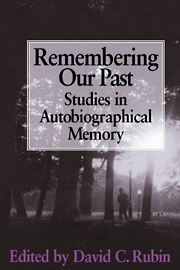Book contents
- Frontmatter
- Contents
- List of contributors
- 1 Introduction
- Part I Approaches
- Part II Accuracy
- Part III Emotions
- 8 Perspective, meaning, and remembering
- 9 Emotional events and emotions in autobiographical memories
- 10 Depression and the specificity of autobiographical memory
- Part IV Social functions
- Part V Development and disruption
- Subject index
- Author index
9 - Emotional events and emotions in autobiographical memories
Published online by Cambridge University Press: 14 October 2009
- Frontmatter
- Contents
- List of contributors
- 1 Introduction
- Part I Approaches
- Part II Accuracy
- Part III Emotions
- 8 Perspective, meaning, and remembering
- 9 Emotional events and emotions in autobiographical memories
- 10 Depression and the specificity of autobiographical memory
- Part IV Social functions
- Part V Development and disruption
- Subject index
- Author index
Summary
“And the question which I have for you (Professor Anita Hill) is how reliable is your testimony in October of 1991 on events that occurred 8, 10 years ago, when you are adding new factors, explaining them by saying you have repressed a lot?,” asked Senator Specter. (Republicans and Democrats alternate in questioning, 1991). It is October 11, 1991, and the U.S. Senate Judiciary Committee is considering the controversial nomination to the Supreme Court of Judge Clarence Thomas. Toward the end of the nomination process, there is a surprise witness. An attorney, Anita Hill, who used to work for Thomas, claims he sexually harassed her a decade earlier. Hill, now a University of Oklahoma law professor, reluctantly agrees to testify in front of the Senate Judiciary Committee, and much of the nation watches spellbound as she testifies on television. “My working relationship became even more strained when Judge Thomas began to use work situations to discuss sex. … His conversations were very vivid. He spoke about acts that he had seen in pornographic films involving such matters as women having sex with animals and films showing group sex or rape scenes. … One of the oddest episodes I remember was an occasion in which Thomas was drinking a Coke in his office.
- Type
- Chapter
- Information
- Remembering our PastStudies in Autobiographical Memory, pp. 218 - 243Publisher: Cambridge University PressPrint publication year: 1996
- 74
- Cited by



